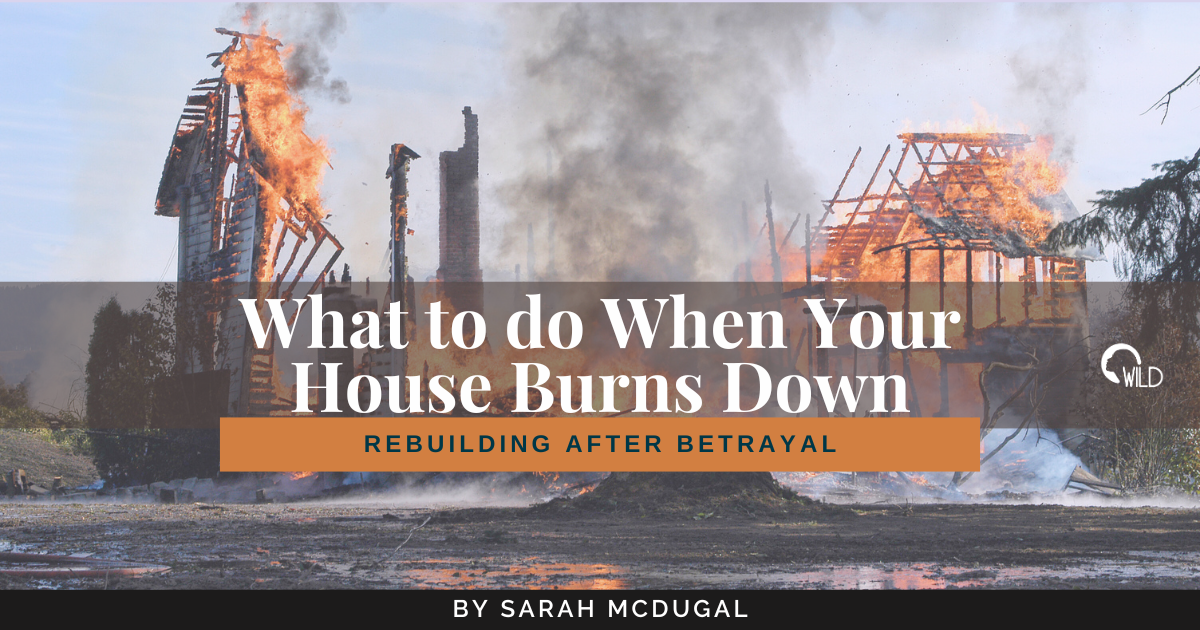Never miss a post.
I'm So Triggered!
- Sarah McDugal
You've been through hell.
You've experienced dehumanization, depersonalization, the systematic disassembling of your autonomy and your voice and your personhood.
Now, on the other side of that trauma -- you are trying to put the pieces of yourself back together. You're trying to figure out what's helpful, what's harmful, what's healing, what's wholesome. You're also wrestling through what simply is... the things that are, simply because they happened in your past, and you may not even know it they exist.
Until it gets triggered.
Let's talk about those challenging moments.
Very often, during post-trauma growth, we find ourselves activated, deeply disturbed, profoundly triggered by something we've encountered in our environment.
Just to be clear, in this article I'm not referring to physiological triggers such as light touch versus firm touch. (And yes, I'll admit that I absolutely hate light touch. If someone lightly strokes or scrapes me, I'm liable to jump out of my skin!) I'm also not talking about overt safety-based triggers, such as someone standing behind you or startling you. If you're like me, you might be the friend who walks into a coffee shop, checks all exits, and takes an instant safety assessment of everyone present. I'll find a seat with a wide-angle view and my back against the wall. That way nobody can sneak up behind me. There's no surprise I can't see coming. And I can all the exits.
These physiological, situational triggers are understandable, especially if you have a history where you've had to look over your shoulder to feel safe.
Right now, I'm talking about the times we get triggered by information. Primarily conversations online or on social media.
You know the scenario... you're scrolling Facebook or Instagram, and someone's comment gets your hackles up.
You want to straighten them out RIGHT NOW! In moments, you're furious, you're outraged, you're laser focused on setting the record straight no matter what.
What happens when your nervous system gets activated by a concept or message that someone else is expressing? What about when you're not in any physical danger, but someone says something (maybe even a comment online?) that gets your blood pressure pounding and you're seeing red?
You need a strategy to assess whether your next steps are healthy or destructive.
If you've grown up in a community that gave you dehumanizing, depersonalizing messages...
If you're in the process of parsing those out and asking yourself, "What can I hold on to? What do I need to get rid of? What is helpful? What is harmful?"...
Then you're likely to encounter messages, whether at church, or online, or in conversations, or even in a song -- that prompt you to feel disturbed.
In the beginning of the healing process, you may be functioning from within a trauma response. For example, if you're stuck in a Flight Response, you may just want to run from everything that feels triggering. If you're stuck in a Fight Response, you may be getting into arguments online with people you've never met. It's pretty normal to experience this.
But if you stay stuck in that trauma response... you're going to blow up a lot of potentially good things in your life, without even intending to.
You're stunned, staring at the rubble of everything you thought was real and safe.
"What just happened?" "How did we get here?" "How do we move on from this?"
"What do I do?"
Life in a fight response includes a lot of black-and-white thinking. Now, rigid thinking may have been part of your upbringing, or culture or past theological beliefs. But as you heal, it's important to be able to hold ideas in tension with each other.
This could look like...
"Yes, that sounds triggering, and... I can recognize that it isn't aimed at me."
"Yes, I feel uncertain about this idea, and... I need to consider it more fully before I decide."
"Yes, that sounded odd, and... perhaps that person is coming from an unfamiliar viewpoint?"
Instead of an instinctive ‘No, but...’ response, post-trauma growth cultivates our capacity for more ‘Yes, and...’ responses.
We see a lot of concepts that appear contradictory at first glance but actually balance each other in healthy tension when we look at the Bible.
Trauma in the Old Testament
True, the Old Testament provides plenty of black and white statements. But not all are prescriptive where God is saying what ought to be. Quite often, the rigid statements are descriptive, telling the stories of what happened.
However, even when statements are instructional and prescriptive, it might help to imagine the children of Israel as trauma kids who needed extremely clear and precise instructions as they re-learned how to think independently.
Imagine... they've just been delivered from 400 years of mind-numbing slave labor. Every waking moment, every action, every thought was dictated and enforced by taskmasters. There was no freedom to think independently, or act with autonomy, or integrate with their emotions as slaves in Egypt. Their personhood was stripped away, for generations. At this point, they were so dehumanized that God had to specify shockingly literal common sense instructions such as, "don't poop where you sleep, dig latrine trenches outside your camp."
But if you think of them as a collective group of terrified, traumatized survivors of assault, starvation, and dehumanization... all of those nitty-gritty rules actually make a lot of sense. God didn't just lead them out into the desert and then drop them there, assuming they could figure out the rest on their own. He gave them directions that were so detailed they were trauma-brain proof.
In the New Testament, the tone changes. Now Jesus isn't talking to the trauma survivors of enslaved Israel. Instead, he's operating on the assumption of much greater moral maturity and emotional stability in His audience. Now, He tells stories... and when the disciples ask Him to give detailed explanations Jesus responds with an expectation of them using their own cognitive abilities. "If you can't figure it out, based on what I've already told you, then you're not ready to understand," is His general message.
What does this have to do with your triggers?
In your early healing, if you're in fight mode, then anything that tripwires your emotions is likely to be met with a volcanic eruption.
As you heal into greater post-trauma growth, you'll begin learning to ask questions instead of just lashing back with statements or accusations. Instead of launching into courtroom mode whenever something feels off, you can begin to choose assessment mode instead.
Next time you're feeling triggered, try to work your way through these four questions to explore more about the information you're reacting to, and better understand your own internal process.
Lady Like Jael | Crop Fleece Pullover
1) Am I triggered because the message itself is truly harmful?
Are my feelings caused by the fact that I just encountered a toxic, evil message, even if it's cloaked in spiritualized or culturally acceptable terms? If Yes, then perhaps you don't need to interact further. Just acknowledge it and remind yourself, "I am not subject to this harmful idea ruling over my life anymore."
Whether it's truly harmful or not, next ask yourself, "Does this message require me to fight back? Is that the best use of my limited energy right now?
If No, then it's time to acknowledge the truth -- yes, the core intent of the message is rooted in power, control, abusive dynamics, exploitation, deception, or whatever the accurate description may be. And no, it doesn't merit any additional investment of your energy.
Tell yourself: "I am going to move beyond this. It deserves exactly zero more attention from me."
2) Am I triggered because my history renders me sensitive to the subject in a way that others may not be?
This doesn't mean sensitive in the context of, "You're so oversensitive." Rather, does your past experience make you alert to nuances others might not even notice?
If Yes, then if the core intent of the message is not innately harmful, ask yourself, "Am I hyper-attuned to this because of what I've been through?"
You have two possible answers:
Yes, I'm hyper-aware of it because of what I've been through. Or...
No, I'm disturbed by this because the message itself is toxic.
If Yes, then ask yourself "Am I understanding the actual core intent of the message accurately?"
Take a moment for personal reflection.
3) Am I understanding this in the way it was intended or am I assuming harmful intent based on my own past?
There might be a variety of answers... for example, the person who posted the information may actually have meant the message in a different context, or for a different audience where it is applicable. Your triggered reaction might be relieved simply by asking questions and coming to a clearer understanding of the original communication. This requires you to practice the ability to withhold judgment and refrain from any conclusion, until you've discovered the context and intention.
If you give yourself the time for this exploration and you discover that the other person intended well, then you have the freedom to release your triggered response, because you now understand the heart of the person who was speaking. This takes you out of yourself and into a healthy, communicative dialogue seeking to understand the other person's motivation.
But what if you take these steps, and it becomes clear that the context and motivation actually wasn't safe or healthy?
Now you've clarified the intent, and you're solidly aware that it was not healthy. Now it's time take the next step, at peace that you weren't just assuming harmful intent based on your own triggers.
Right after you've escaped an abusive environment, you're not likely to have this level of post-trauma growth. But I want to challenge you, even if you're fresh on this journey, to see this type of self-disciplined interaction as the goal and gradually put this mindset into practice.
Are you one of WILD's biggest fans?
Give the gift of abuse recovery to women in countries w/o resources!
4) Can I now engage in discussion with the other person and suspend my triggered state, while giving them a chance to clarify and explain?
This doesn't mean that your nervous system isn't activated. It doesn't mean that you may not ultimately conclude that the situation fully merited your triggered response.
It simply means that you are healed enough to allow yourself space between the trigger and the response, to give time to consider your next steps. The process you explore in this suspended space, may result in going either direction:
-
I can engage in discussion that will ultimately resolve and relieve my sense of trigger due to my capacity to suspend conclusions until I understand where you're coming from.
At this stage of post-trauma growth, you'll find yourself less quick on the draw, less ready to fight. You're able to give space for others to express themselves in a way that may be different than you would express yourself. But because you understand their heart and their core intention, you're able to give them space to be an authentic individual, according to their own gifts and personality and way of expressing things. You're able to recognize that we can coexist in mutual support of each other without sharing identical views. They don't have to be exactly like you, and you don't have to be exactly like them. This is a huge indicator of post-trauma healing.
I can engage in a discussion that will ultimately confirm my sense of trigger because after suspending conclusions and exploring the nuances, I realize the message was indeed intended to convey a concept that causes real harm.
It was not simply my perception of harm based on my own past trauma. My sense of trigger is now resolved, but it is confirmed rather than relieved, because I recognize that the situation was not solely my perception of harm in the way it was communicated, but the reality of harm due to the content or the intention.
Now that you have either confirmed or relieved your sense of being triggered, you are in the position to decide that you are no longer going to let it take space in your brain or consume your emotional energy. Because you have the power to choose where you interact, and to focus your time on things that have the potential of becoming healthy and good.
It's okay if you're not there yet... You can take micro-steps from whatever point you're at right now. Give yourself the grace to practice seeking to understand nuance, to hold opposing concepts in tension, to take the time to say "Yes, and..." as you grow toward a healthy and balanced mutuality.
Instead of trying to box everything and everyone around you into categories of either good or bad, practice pausing and asking, "How can I find a both/and, or a yes/and" in this situation. Then suspend your conclusion and make sure you've sought to understand the core intention of the other person before moving forward.
When the message that triggered you is revealed to be harmful or evil, then you can also respect yourself and no longer engage with the situation. If it is revealed to be caring and good (or even neutral), and you simply misunderstood based on your own past experiences, take it as an opportunity to grow so that you can understand other people and yourself more fully.
Cultivating a mindset that is open to both/and will help to bring you out of stuck trauma response mode into increasingly healthy, whole, safe interactions with other people... people you love, people you just met, even the people you never see want to see again. 😏
If you’re wondering which season of healing you’re in right now, grab the Seasons of Healing workshop today!
"Seasons of Healing" Launches You on the Path to:
know which season of healing you're in right now.
discern what your mind & body need most in this season.
identify the four growth pillars of healing.
experience the four mindset shifts that lead to wholeness.
You'll begin to:
reclaim your voice from the silence.
take back control of your choices.
find purpose in the pain.
build healthy new patterns.
Or join the SCOOP and get any workshop, course, or coaching for 15% OFF today!
Want more articles like this?
Get new posts straight to your inbox!


